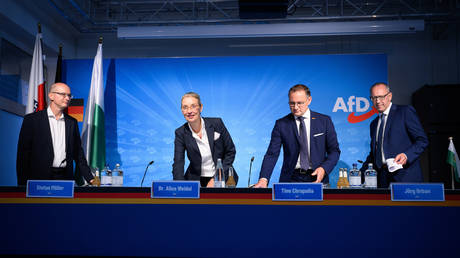Fyodor Lukyanov Claims EU Elites Have a Strategy to Counter the 'Populists'
Explore how the rise of the far right and far left is set to influence politics in the EU’s most influential nation.

The elephant in the room has only grown larger. Germany is experiencing heightened anxiety following significant electoral victories for non-systemic parties in two eastern states over the weekend. ‘Alternative for Germany’ emerged victorious in Thuringia and secured a close second place behind the establishment CDU in Saxony.
The newly established ‘Sarah Wagenknecht Bloc’ decisively outperformed her former Die Linke colleagues, taking third place in both states. The near-total collapse of the ruling federal coalition was a development many had anticipated. More elections are on the horizon this month in Brandenburg, where the recent winners also hold high hopes.
It’s only been relatively recently that the eastern states have garnered increasing attention from the German establishment. Almost 35 years have elapsed since the dissolution of the GDR and its integration into the Federal Republic. The challenges of integration were a hot topic in the 1990s but faded from the limelight. During the initial phase, discussions primarily focused on the level of investment needed in the new states and the efficiency of that spending. Meanwhile, the socio-political realities in these areas had minimal impact on the overall political landscape in Germany.
In fact, it has only been in the past decade that it has become apparent that integration has not proceeded as smoothly as hoped and that disparities remain significant. The altered external and internal circumstances have created fertile ground for the rise of far-right and far-left sentiments. Initially, the latter attracted little concern as they were represented by the Left Party, the successors to the GDR’s old Communists. However, the party's fragmentation and the rise of the charismatic Frau Wagenknecht as a distinct political force have caused alarm among the ruling class, though it remains uncertain how long she will maintain her influence. There also exists the possibility that she might be assimilated into the mainstream.
In any case, the existence of a separate eastern dynamic within Germany has been clearly confirmed. This reality underscores the damage inflicted by the arrogance that seized the Western establishment after the Cold War, both globally and nationally. Disregarding the perspectives of those viewed as "losers" has resulted in substantial challenges both worldwide and within individual nations. On a broader scale, the elections in Thuringia and Saxony reflect an intriguing trend in Western Europe. Although the far right and far left are experiencing successes, these victories are unlikely to translate into positions of power. A notable example is France, where Macron, despite his struggles and being labeled a political liability, is poised to appoint a prime minister of his choice rather than someone favored by recent election victors.
However, these developments do not go unnoticed. The political process increasingly resorts to sophisticated manipulations to completely bypass, or at least marginalize, the non-systemic parties and their rising support.
The more entities deemed persona non grata, the more challenging it becomes to form coalitions without including them. This necessitates an ideological homogenization of the remaining parties, rendering the electoral process essentially meaningless. Throughout campaigns, parties highlight their differences, only to be compelled to focus on their similarities post-election.
While this is a standard characteristic of any multi-party democracy with more than two main players, the emergence of the “elephant in the room”—political forces whose growing influence is considered illegitimate—distorts the previously natural progression.
The alliance of former adversaries does not arise from shared interests or reasonable concessions but rather from a somewhat panicked atmosphere of ‘anything but this!’ This results in the very qualities that make extreme but ideologically driven movements appealing: the unification of respectable political forces into a vague centrist entity with ambiguous views. Consequently, the divide is not one of opinions but rather between the acceptable—the ‘clean’—and the unacceptable—the ‘unclean.’ This increasingly frustrates voters, with a growing number feeling deceived and consequently gravitating toward the ‘impure’, whom they perceive as more genuine. It’s a vicious cycle.
So far, across the board, the ‘extremes’ have lacked the cunning and skill to outmaneuver their opponents in this post-election landscape. The Italian experience illustrates that those who ‘slay the dragon’ often end up emulating it. Nonetheless, the upward trend of disaffected voters casting ‘wrong’ ballots is linear, which is what truly intimidates the establishment. While it has managed to retain control thus far, its future is uncertain.
It is reasonable to anticipate that, in the medium term, these dynamics could lead to a significant reshaping of the European political landscape. Paradoxically, however, this landscape remains stable in its current form. No one has convincingly articulated alternative ideologies to the prevailing ‘European values’ under American guidance. As mentioned, the breakthrough of former ‘outsiders’ into the first tier does not signify a rearrangement of the elites but rather the normalization of the newcomers. The EU/NATO framework has a strong protective buffer that helps keep the political field within the same bounds. This brings us to the question of whether we should expect any shifts in policies that might impact Russian interests. As of now, the answer appears to be no.
This article was first published by Profile.ru and was translated and edited by the RT team.
Lucas Dupont contributed to this report for TROIB News












